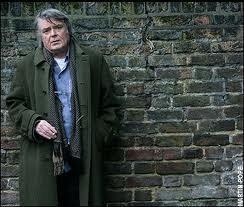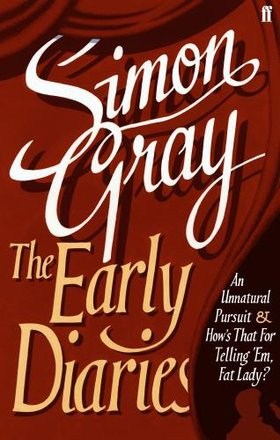On the stage and on the rocks

Unnatural Pursuits and How's That For Telling 'Em, Fat Lady?, playwright Simon Gray's painfully funny account of two shambolic productions of his works in London the 1980's, are the most amusing and eye-opening theatrical memoirs yet written. By Edward O'Hare.
For two seasons in the 1980's the English playwright Simon Gray kept a diary. Returning home in the early hours of the morning he would switch on a tape machine and record his fresh impressions of the staging of his latest play, The Common Pursuit, while an endless succession of cigarettes and malt whiskies passed through his fingers. The play, about four privileged Cambridge undergraduates who set up a literary magazine, had taken Gray several years to write but he still felt uneasy about it. This was understandable. Gray had enjoyed a rather chequered career, with an equal number of box-office smashes and massive flops on his résumé. Critics were his sworn enemies, a fact which may have had something to do with them being the targets of his most barbed jokes. But when Gray completed The Common Pursuit the stakes were even higher. Not only for professional but financial reasons he needed a big hit.
The play's prospects brightened when Gray gave the final draft to his friend and collaborator Harold Pinter, who thought the play had all the hallmarks of success and agreed to direct it. A London theatre was chosen, dates were confirmed, a producer came aboard, and then The Common Pursuit's luck ran out. Gray and Pinter found themselves at the mercy of a tidal wave of unprofessionalism and double-dealing. A theatre company took on the play and promptly turned it down. An alternative was found but its gross unsuitability only became obvious after the contracts had been signed. Actors claimed that they were interested and available before revealing that they were neither available nor interested, leaving Gray and Pinter in the unusual position of being in a city with thousands of 'starving' actors and yet unable to cast their play.
Other more insidious dangers threatened the production. Despite initially believing The Common Pursuit to be in pretty good shape, Gray and Pinter had to tear it apart as soon as rehearsals began. Added to this chaos were numerous instances of vanity, deceit, bitchiness and incompetence. Despite having a main actor with an inaudible voice and a script rewritten on a daily basis, The Common Pursuit was saved by Pinter's clear-minded direction, the cast's professionalism and Gray's willingness to accept his mistakes and to everyone's relief audiences responded with measured enthusiasm. Then, just as money began to trickle in, the backers got cold feet and Gray and Pinter were robbed of their triumph. After surviving a panoply of misfortunes The Common Pursuit never transferred to the West End.
Two years after its first run Gray was lured to Los Angeles to oversee a production of The Common Pursuit. If he believed his last experience in the theatre had exhausted every possibility for calamity he was wrong and Gray came up against an egomaniac director who believed that all the production's problems could be solved if the actors flexed their 'life-muscles,' American players with extremely misguided notions about the English middle classes, a producer with a gambling addiction and a set that looked like the creation of some deranged Surrealist. Convinced that the play would bomb Gray was again left dumbstruck when The Common Pursuit was almost universally lauded and transferred to New York.
But the fates were still not finished with him. As soon as Gray's duties in Los Angeles were over he found himself in Dallas directing another of his works, Dog Days. Then things started getting dangerous. Burnt-out, terribly homesick and filled with revulsion by the play he had written 15 years before, Gray went off the deep end. He began taking champagne breakfasts and drinking goblets of Glenfiddich during rehearsals. His paranoia deepened, he feuded with his production designers (whose ineptitude had rendered his actors invisible) and plotted to murder a hotel lobby pianist who kept waking him at sunrise. He suffered from nocturnal terrors and became convinced that he was being stalked by a portly man dressed in tartan. To his disbelief Dog Days managed to avoid disaster and met with such acclaim that Gray was made an honorary citizen of Dallas before he fled back across the Atlantic.
Thanks to books like The Smoking Diaries (2005) Simon Gray is now rightfully counted among the best memoirists of the last fifty years but this frank, acerbic and hilarious double-volume, An Unnatural Pursuit and How's That For Telling 'Em, Fat Lady?, offers a glimpse of him in his hectic prime. The author of more than thirty plays, Gray was at his best when describing the illogicality and irrationality of what he termed "life, old life itself." He could treat others naughtily, and has some pretty devastating things to say about the hell that was 1980's Hollywood, but he was only ever cruel when writing about himself. Accompanying him as he stumbles from one catastrophe to another (taking up residence in the world's worst hotel, being driven at knuckle-whitening speed by a drunken lady journalist who has attempted to seduce him, virtually living in a bar beside the theatre when things get out of control, finding that a review of one of his books is accompanied by a photograph in which he looks like "a plump and degenerate lesbian") is so enjoyable that the pages can hardly turn fast enough.

The Early Diaries: An Unnatural Pursuit & How's That For Telling 'Em, Fat Lady?
By Simon Gray
Published by Faber and Faber
PP 473
